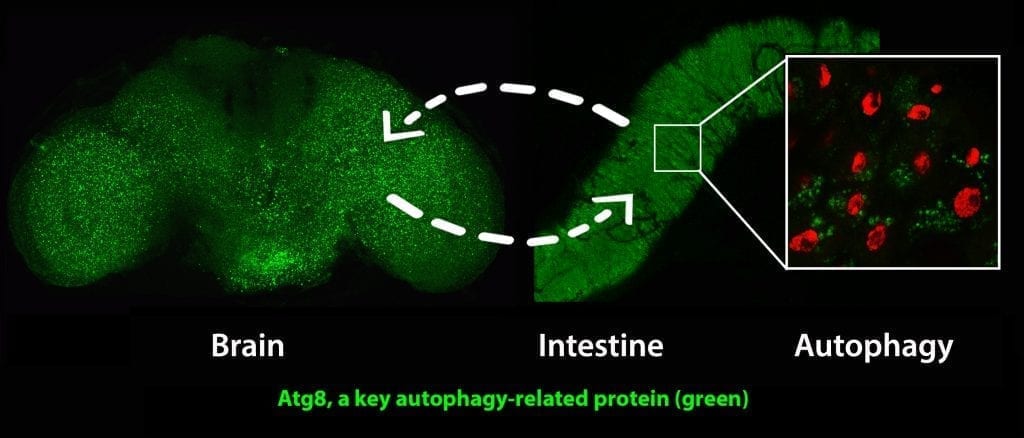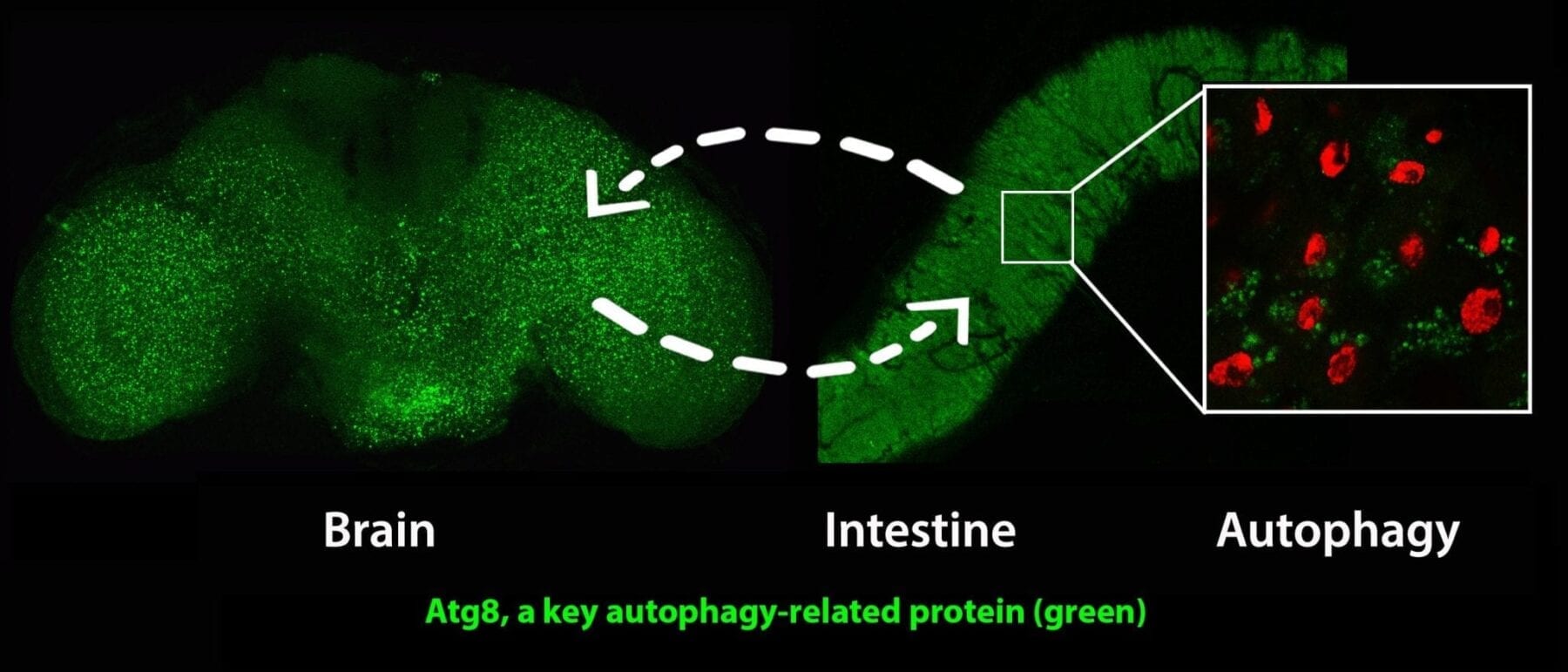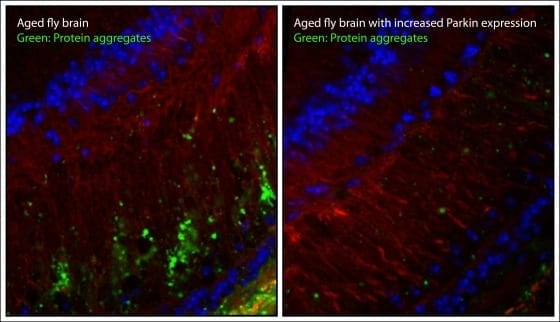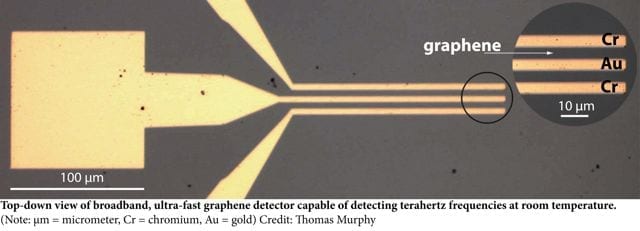
‘Remote control’ of aging
Activating a gene called AMPK in the nervous system induces the anti-aging cellular recycling process of autophagy in both the brain and intestine. Activating AMPK in the intestine leads to increased autophagy in both the intestine and brain. Matthew Ulgherait, David Walker and UCLA colleagues showed that this “inter-organ” communication during aging can substantially prolong the healthy lifespan of fruit flies.
UCLA biologists have identified a gene that can slow the aging process throughout the entire body when activated remotely in key organ systems.
Working with fruit flies, the life scientists activated a gene called AMPK that is a key energy sensor in cells; it gets activated when cellular energy levels are low.
Increasing the amount of AMPK in fruit flies’ intestines increased their lifespans by about 30 percent — to roughly eight weeks from the typical six — and the flies stayed healthier longer as well.
The research, published Sept. 4 in the open-source journal Cell Reports, could have important implications for delaying aging and disease in humans, said David Walker, an associate professor of integrative biology and physiology at UCLA and senior author of the research.
“We have shown that when we activate the gene in the intestine or the nervous system, we see the aging process is slowed beyond the organ system in which the gene is activated,” Walker said.
Walker said that the findings are important because extending the healthy life of humans would presumably require protecting many of the body’s organ systems from the ravages of aging — but delivering anti-aging treatments to the brain or other key organs could prove technically difficult. The study suggests that activating AMPK in a more accessible organ such as the intestine, for example, could ultimately slow the aging process throughout the entire body, including the brain.
Humans have AMPK, but it is usually not activated at a high level, Walker said.
“Instead of studying the diseases of aging — Parkinson’s disease, Alzheimer’s disease, cancer, stroke, cardiovascular disease, diabetes — one by one, we believe it may be possible to intervene in the aging process and delay the onset of many of these diseases,” said Walker, a member of UCLA’s Molecular Biology Institute. “We are not there yet, and it could, of course, take many years, but that is our goal and we think it is realistic.
“The ultimate aim of our research is to promote healthy aging in people.”
The Latest on: Aging
[google_news title=”” keyword=”Aging” num_posts=”10″ blurb_length=”0″ show_thumb=”left”]
via Google News
The Latest on: Aging
- Stepping On program for aging adults: ‘Falls are not an inevitable part of aging, they are 100% preventable’on May 1, 2024 at 5:27 pm
And there is no question, that falls have become a critical indicator of life expectancy and quality of life for older adults.
- Aging Hubble Space Telescope Roars Back To Life After Glitchon May 1, 2024 at 3:21 pm
A fussy gyroscope won't keep the Hubble Space Telescope down. NASA brought the iconic observatory back online after fixing the latest technical problem.
- High blood pressure drug called 'rilmenidine' dramatically slows aging in animalson May 1, 2024 at 2:41 pm
A drug used for high blood pressure, known as rilmenidine, may also be effective in slowing the aging process.
- Aging Pet Population Is 'Solid Longer-Term Tailwind' For IDEXX Labs: Analyston May 1, 2024 at 2:27 pm
IDEXX Laboratories reports Q1 EPS of $2.81 (up 10% Y/Y), with sales reaching $964M (7% increase). Revenue growth driven by Companion Animal Group and Water segments. Operating margin at 31.0%. 2024 ...
- Demi Moore, 61, Defies Aging as She and Daughters Slip Into Bikinis for Beach Dayon May 1, 2024 at 2:16 pm
Many fans agreed that the Ghost star, in particular, defied aging as Moore, 61, slipped into a leopard-print string bikini for the fun video. Moore captioned her Tuesday, April 30 Instagram post with ...
- Sofía Vergara Candidly Shares How She Feels About Agingon May 1, 2024 at 10:18 am
Sofía Vergara revealed she's trying to hold onto her youth as much as possible and prolong getting older. As she put it, "I'm going to fight it every step of the way!" ...
- It's officially time to abandon the Oculus Quest 2, as new VR games and apps are dodging the aging headseton May 1, 2024 at 9:27 am
The past few weeks have been bursting with major XR announcements. Pimax unveiled a headset that can swap between an OLED and QLED display, Meta teased its first-ever AR glasses and announced its ...
- Jean Smart Talks Family, Grief and Aging: ‘Every Day Is Precious Now’on May 1, 2024 at 6:14 am
Actor plays veteran comedian striving to stay relevant, shares why she feels the show’s intergenerational dynamic resonates ...
- Tyra Banks Urges Women to Embrace the 'Natural Beauty' of Aging (Exclusive)on May 1, 2024 at 5:17 am
The best part about being 50, according to 'America's Next Top Model' host and supermodel Tyra Banks? Fewer insecurities and "permission to say whatever the heck I feel like saying" — including that ...
- Spayed and Neutered Dogs Show More Signs of Agingon April 30, 2024 at 6:02 pm
Data indicates that spaying and neutering can increase the risk of physical problems, including cancers. New research demonstrates that spayed and neutered dogs are more likely to show increased signs ...
via Bing News











